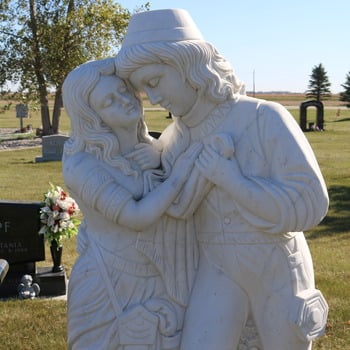Working through grief
-
October 23, 2025My first experience processing real grief came when I was 23 years old. A beloved cousin of mine, a brother more than a cousin, was killed in a car crash that he caused. The crash not only took his life, but that of a friend of his, and a family traveling in the opposite direction on the freeway. My first reaction was devastating sadness. I couldn’t believe my dear cousin was gone. I sat numb at his funeral Mass and could hardly bring myself to attend his burial.
At the time of his death, I was traveling in a rock band out of Fargo/Moorhead, but I really had no direction in my life. I was ready to leave the band, and at my cousin’s funeral I asked my parents if I could move back home for a while, which they agreed to. My cousin’s death only added to my issues, with grief piling on despair as I tried to make some sense out of my life. Later, my grief turned to anger. How could my cousin have gotten behind the wheel that night after drinking so much? How could he leave me alone like this? I blamed his actions for everything that was going wrong in my life at the time.
Nearly everyone experiences some sort of grief in life, and each handles grief in their own way. Grief doesn’t have to be from the loss of a loved one or friend. We also feel grief over the loss of a marriage, job, or losing a friend through a difference of opinion.
“Grief is something we live with our whole lives,” said Father Chad Wilhelm, pastor of St. James Basilica in Jamestown. “We as human beings just do not simply forget, because memory is a gift from God to each person. Memory and grief come in waves in our life. Grief is holy ground. It’s where love and loss meet. When someone comes to me in grief, I don’t try to offer quick answers or platitudes. I listen. I let them speak their loved one’s name, tell their story, shed their tears. Then I remind them that grief is the price of love, and because love never ends, neither does our connection with those who have died in Christ. Our Catholic faith doesn’t deny sorrow—it redeems it. The Cross of Christ teaches us that from death, God brings life, and from pain, he brings hope.”
Unfortunately, during my grieving for my cousin, I did not turn to God. In fact, I was angry with him. I blamed God for letting my cousin get behind that wheel. I blamed God for all of my life failures that led me to the emotional crisis I was in and for my lack of initiative. I blamed him for pushing me away from my Catholic faith and the Mass. Everything was piling up on me. It was then I made a decision to put my first 23 years behind me and to start fresh. I needed direction and the United States Air Force provided it.
Through God’s mercy, it was an Air Force Catholic chaplain during basic training who brought me back to Christ and his Church, helped me to grieve for and forgive my cousin, and helped me ask God to forgive me to for blaming all of my troubles on him.
Each November, we are asked to pray for and remember not only the saints in heaven who pray for us but for our deceased loved ones as well.
“The month of November begins with two profound feasts,” said Father Wilhelm. “All Saints’ Day on Nov. 1, celebrating all who are in heaven, and All Souls’ Day on Nov. 2, when we pray for those who have died but are still being purified in Purgatory. From these two days, the entire month becomes a sacred time of remembrance. The Church, in her wisdom, reminds us that our bonds of love do not end with death. Through prayer, Masses, and acts of charity, we assist those souls who are on their final journey to heaven. It’s an expression of the Communion of Saints, the unbreakable connection between the faithful on earth, the souls in Purgatory, and the saints in heaven. In a world that often avoids the topic of death, November gently invites us to reflect on eternity, mercy, and the great hope that comes from our faith in the Resurrection.”
Since that time long ago, I have experienced more grief. Being fired from a job I worked hard to get, losing touch with friends I served with in the military, and most importantly the deaths of my mother and father. My experience from the past helped me to recognize my grief as a part of my life experiences. When my mother passed, I stayed with my father and helped him through his initial grieving process, and that helped me to stay focused on how life goes on. After my father passed away six years later, I relied on my wife and son heavily to help me through the process, and I suppose I had also matured to a point that the grief I experienced after his death didn’t affect me as much as it would have in the past. It also helps that when I experience grief, I now first turn to God.
“Our faith doesn’t only point us toward heaven,” said Father Wilhelm. “It also teaches us how to live on the way to heaven. When we remember the dead, we are also reminded to live each day with purpose and gratitude. The awareness of death isn’t meant to fill us with fear, but with urgency for love, forgiveness, and holiness. It helps us to let go of grudges, to cherish relationships, to live in a state of grace.”

